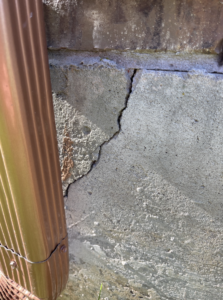Cracks in Masonry Walls

Exterior Wall Covering
Regardless of the type of cladding covering the exterior of homes, most homes’ foundations are built using a reinforcing metal structure covered by some kind of concrete or masonry. Over time, cracks in masonry walls may develop. If your home has a masonry foundation (including masonry walls), here are some things to know, especially if you notice the development of any defects, cracks, or moisture intrusion in your crawlspace or basement.
Every homeowner should occasionally check the exterior of their home and the foundation, especially if there have been severe weather or geological events, such as heavy rains, flooding, or seismic activity, or nearby construction or industrial work that creates noticeable vibration, such as roadwork, the installation of oil or gas wells or pipeline, etc.
Before looking at the exterior, it’s useful to know which walls are load-bearing and which are not. Usually, this can be done by examining the beams and joists in the basement, crawlspace or attic. Also, note whether the walls are solid masonry or masonry-cavity, non-structural brick, or stone veneer. The overall quality of the building’s construction, and often that of its neighborhood, will be a good indicator of the condition of your home’s masonry.
All exposed masonry should be inspected for the following:
- cracking;
- spalling, which is the chipping or flaking of concrete, bricks or other masonry when improper drainage or venting and freeze-thaw weather cycling exists;
- bowing, which is the term used to describe vertical bulging;
- sweeping, which is horizontal bulging;
- leaning; and
- mortar deterioration.
Masonry Cracks
Although masonry can deform elastically over long periods of time to accommodate small amounts of movement during freeze-thaw cycles, large movements can cause masonry cracking, which may appear along the mortar joints or through the masonry units.
Cracking can result from a variety of problems:
- differential settlement of the foundation;
- drying shrinkage (particularly in a concrete block foundation);
- expansion and contraction due to ambient thermal and moisture variations;
- improper support over door and window openings, which is the effect of freeze-thaw cycles;
- the corrosion of iron and steel wall reinforcement;
- differential movement between building materials;
- the expansion of salts in the cement mixture;
- efflorescence, which is the white powder that forms on the surface of concrete/masonry walls as a result of water evaporation (and a cosmetic issue only); and
- the bulging or leaning of walls.
Testing
Most common masonry wall cracks are caused by thermal or moisture expansion. Active cracks can be sealed with a flexible sealant. Inactive cracks may be pointed, which is the process of filling joints between masonry units or bricks with mortar. Some of this work should be undertaken by a masonry professional.
If there are evident or suspected problems, two methods of testing are sometimes useful for assessing masonry. This first test should be performed by a qualified masonry contractor. Probe holes can be drilled through the joints or masonry units with a masonry bit and probed with a stiff wire (or a fiber optic camera) to determine a wall’s thickness and the adequacy of its mortar. The probe holes are then patched after the investigation has been completed.
A hammer test can be used to determine the structural soundness of masonry units and their bond to the mortar. In a hammer test, the masonry is tapped lightly with a hammer, and the resonance of the sound produced is evaluated. Individual bricks can be replaced and the mortar re-pointed, as damaged bricks cannot be repaired. If re-pointing, the new mortar should be of the same composition as the existing mortar to prevent deterioration.
Historically Speaking
There may be a substantial difference in the masonry walls in buildings built during the last 40 to 50 years compared to those constructed earlier. Walls became thinner as designers began to more effectively exploit the compressive strength of masonry. This was done by using higher-strength masonry materials and mortars. But this change came at the expense of flexibility; as such, today’s masonry walls and foundations are often more brittle than their massive ancestors and, therefore, particularly susceptible to stress-induced damage. That’s why homeowners should be vigilant with their homeowner maintenance plan by occasionally checking the condition of their home’s foundation, along with any masonry walls.
Home Run Inspections, LLC
Oklahoma: 405-905-9175
Florida: 850-203-3239
We Cover All the Bases!
Serving the Oklahoma City metro and surrounding areas including Edmond, Yukon, Piedmont, Bethany, El Reno, Tuttle, Mustang, Moore, Norman, Midwest City, Del City, Choctaw, McCloud, Shawnee, Harrah, Newalla, Jones, and more.
Also Now Serving the Florida Panhandle metro areas including Destin, Fort Walton Beach, Okaloosa Island, Miramar Beach, Santa Rosa Beach, Niceville, Shalimar, Freeport, Crestview, DeFuniak Springs, Panama City Beach, and more.
Schedule Your Inspections Online at:
Like us on FaceBook
Follow us on Twitter
Follow us on Instagram

